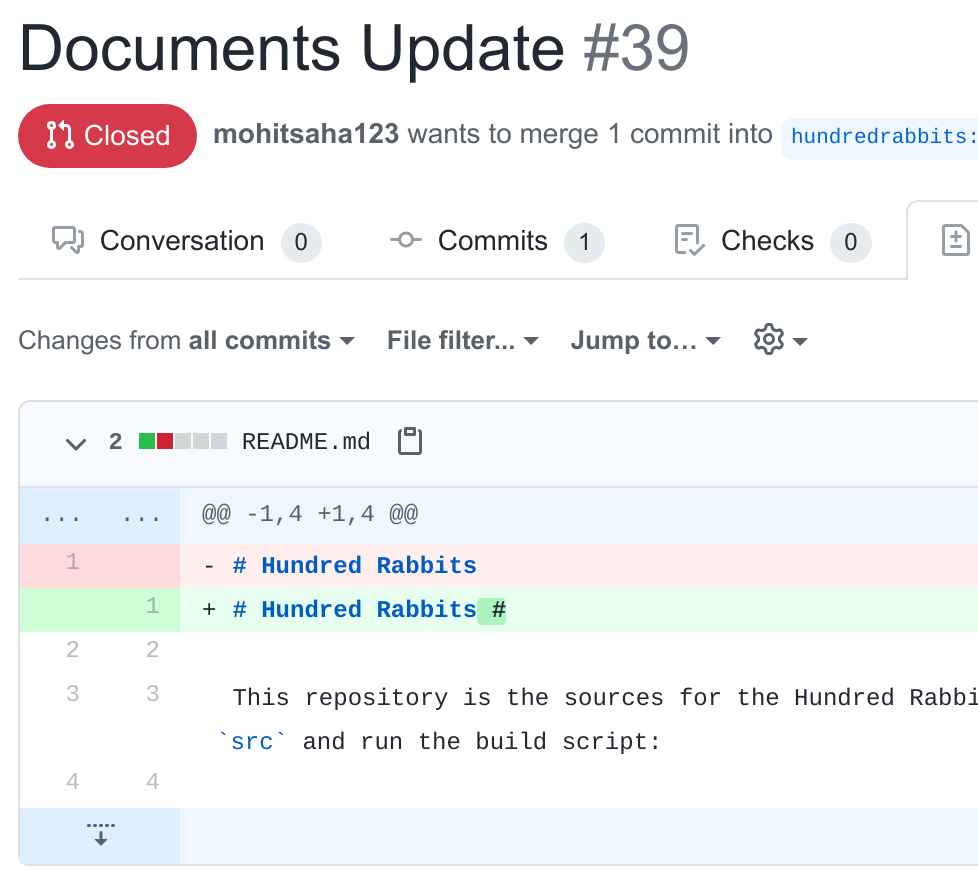Feed digilinux.ru [copy] http://digilinux.ru/feed/ has loading error: cURL error 22: The requested URL returned error: 403 Forbidden
Feed freepost [copy] https://freepo.st/rss/new has loading error: cURL error 22: The requested URL returned error: 500
Spamtoberfest
https://oc.todon.fr/@val/104960502585461740/embed

As I’ve written before, the best contributors to a FOSS project are intrinsically motivated to solve problems in your software. This sort of contribution is often fixing an important problem and places a smaller burden on maintainers to spend their time working with the contributor. I’ve previously contrasted this with the “I want to help out!” contributions, where a person just has a vague desire to help out. Those contributions are, generally, less valuable and place a greater burden on the maintainer. Now, DigitalOcean has lowered the bar even further with Hacktoberfest.
Disclaimer: I am the founder of a FOSS project hosting company similar to GitHub.
As I write...
A tale of two libcs
I received a bug report from Debian today, who had fed some garbage into scdoc, and it gave them a SIGSEGV back. Diving into this problem gave me a good opportunity to draw a comparison between musl libc and glibc. Let’s start with the stack trace:
==26267==ERROR: AddressSanitizer: SEGV on unknown address 0x7f9925764184
(pc 0x0000004c5d4d bp 0x000000000002 sp 0x7ffe7f8574d0 T0)
==26267==The signal is caused by a READ memory access.
0 0x4c5d4d in parse_text /scdoc/src/main.c:223:61
1 0x4c476c in parse_document /scdoc/src/main.c
2 0x4c3544 in main /scdoc/src/main.c:763:2
3 0x7f99252ab0b2 in __libc_start_main
/build/glibc-YYA7BZ/glibc-2.31/csu/../csu/libc-start.c:308:16
4 0x41b3fd...
 Drew DeVault's blog
Drew DeVault's blog
TOFU recommendations for Gemini
I will have more to say about Gemini in the future, but for now, I wanted to write up some details about one thing in particular: the trust-on-first-use algorithm I implemented for my client, gmni. I think you should implement this algorithm, too!
First of all, it’s important to note that the Gemini specification explicitly mentions TOFU and the role of self-signed certificates: they are the norm in Geminiland, and if your client does not support them then you’re going to be unable to browse many sites. However, the exact details are left up to the implementation. Here’s what mine does:
First, on startup, it finds the known_hosts file....
The unrealized potential of federation
There are some major problems on the internet which may seem intractable. How do we prevent centralization of our communication tools under the authority of a few, whose motivations may not align with our interests? How do we build internet-scale infrastructure without a megacorp-scale budget? Can we make our systems reliable and fault-tolerant — in the face of technical and social problems?
Federation is an idea which takes a swing at all of these problems.
Note: apparently some cryptocurrency enthusiasts are parading this article around to peddle their garbage. Cryptocurrency is the digitally woke techbro’s ponzi scheme, and is a massive waste of electricity and developer effort. Anyone who tells...
Making Music with Computers: Two Unconventional Approaches
I love music. I really, really love music. Hopefully you’ll forgive the departure from the usual topics.
[…]
Status update, September 2020

A mercifully cool September is upon us, and after years of searching, I finally was able to secure Club Mate in the US. Let’s decant a bottle and recant the story of this month’s progress in free software development.
First of all, I’ve been able to put a pin on operations work on SourceHut for the time being, and focus again on its software development. The GraphQL APIs are a major focus area here, and I’ve made a lot of progress towards OAuth 2.0 support and writable GraphQL APIs. Additionally, I’ve laid out a number of prioritized tickets for the beta — with the “beta” label on...
Linux development is distributed - profoundly so
The standard introduction to git starts with an explanation of what it means to use a “distributed” version control system. It’s pointed out that every developer has a complete local copy of the repository and can work independently and offline, often contrasting this design with systems like SVN and CVS. The explanation usually stops here. If you want to learn more, consider git’s roots: it is the version control system purpose-built for Linux, the largest and most active open source project in the world. To learn more about the true nature of distributed development, we should observe Linux.
Pull up your local copy of the Linux source...